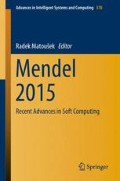Abstract
Particle swarm optimisation (PSO) is an optimisation algorithm in which particles traverse a problem space moving towards promising locations which either they or their neighbours have previously visited. This paper presents a new PSO variant with the Avoidance of Worst Locations (AWL). This variation was inspired by animal behaviour. In the wild, an animal will react to negative stimuli as well as positive, e.g. an animal looking for food will also be conscious of danger. PSO AWL enables particles to remember previous poor solutions as well as good. As a result, the particles change the way they move and avoid known bad areas. Balancing the influence of these poor locations is vital. The research in this paper found that a small influence from bad locations on the particles leads to a significant improvement on overall performance when compared to the standard PSO. When compared to previous implementations of worst location memory, PSO AWL demonstrates vast improvements.
Access this chapter
Tax calculation will be finalised at checkout
Purchases are for personal use only
References
Bratton, D., Kennedy, J.: Defining a standard for particle swarm optimization. In: Swarm Intelligence Symposium, SIS 2007, pp. 120–127. IEEE (2007)
Broderick, I., Howley, E.: Particle swarm optimisation with enhanced memory particles. In: Dorigo, M., Birattari, M., Garnier, S., Hamann, H., Montes de Oca, M., Solnon, C., Stützle, T. (eds.) ANTS 2014. LNCS, vol. 8667, pp. 254–261. Springer, Heidelberg (2014)
Clerc, M., Kennedy, J.: The particle swarm–explosion, stability, and convergence in a multidimensional complex space. IEEE Trans. Evol. Comput. 6(1), 58–73 (2002)
Helwig, S., Wanka, R.: Theoretical analysis of initial particle swarm behavior. In: Rudolph, G., Jansen, T., Lucas, S., Poloni, C., Beume, N. (eds.) PPSN 2008. LNCS, vol. 5199, pp. 889–898. Springer, Heidelberg (2008)
X. Hu, Eberhart, R.C., Shi, Y.: Particle swarm with extended memory for multiobjective optimization. In: Swarm Intelligence Symposium, SIS’03. Proceedings of the 2003 IEEE, pp. 193–197. IEEE (2003)
Jayabarathi, T., Kolipakula, R.T., Krishna, M.V., Yazdani, A.: Application and comparison of PSO, its variants and hde techniques to emission/economic dispatch. Arab. J. Sci. Eng. 39(2), 967–976 (2014)
Kennedy, J.: Particle swarm optimization. In: Encyclopedia of Machine Learning, pp. 760–766. Springer (2010)
Kennedy, J., Mendes, R.: Population structure and particle swarm performance. In: Proceedings of the 2002 Congress on Evolutionary Computation, CEC’02, vol. 2, pp. 1671–1676. IEEE (2002)
Liu, H., Howely, E., Duggan, J.: Particle swarm optimisation with gradually increasing directed neighbourhoods. In: Proceedings of the 13th Annual Conference on Genetic and Evolutionary Computation, pp. 29–36. ACM (2011)
Poli, R., Kennedy, J., Blackwell, T.: Particle swarm optimization. Swarm Intell. 1(1), 33–57 (2007)
Robinson, J., Rahmat-Samii, Y.: Particle swarm optimization in electromagnetics. IEEE Trans. Antennas Propag. 52(2), 397–407 (2004)
Selvakumar, A.I., Thanushkodi, K.: A new particle swarm optimization solution to nonconvex economic dispatch problems. IEEE Trans. Power Syst. 22(1), 42–51 (2007)
Suganthan, P.N., Hansen, N., Liang, J.J., Deb, K., Chen, Y.-P., Auger, A., Tiwari, S.: Problem defnitions and evaluation criteria for the CEC 2005 special session on real-parameter optimization. KanGAL Report 2005005, 2005 (2005)
Xu, S., Rahmat-Samii, Y.: Boundary conditions in particle swarm optimization revisited. IEEE Trans. Antennas Propag. 55(3), 760–765 (2007)
Yang, C., Simon, D.: A new particle swarm optimization technique. In: 18th International Conference on Systems Engineering, ICSEng 2005, pp. 164–169. IEEE (2005)
Author information
Authors and Affiliations
Corresponding author
Editor information
Editors and Affiliations
Rights and permissions
Copyright information
© 2015 Springer International Publishing Switzerland
About this paper
Cite this paper
Mason, K., Howley, E. (2015). Avoidance Strategies in Particle Swarm Optimisation. In: Matoušek, R. (eds) Mendel 2015. ICSC-MENDEL 2016. Advances in Intelligent Systems and Computing, vol 378. Springer, Cham. https://doi.org/10.1007/978-3-319-19824-8_1
Download citation
DOI: https://doi.org/10.1007/978-3-319-19824-8_1
Published:
Publisher Name: Springer, Cham
Print ISBN: 978-3-319-19823-1
Online ISBN: 978-3-319-19824-8
eBook Packages: EngineeringEngineering (R0)

